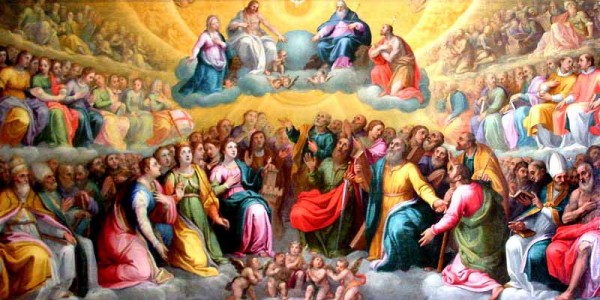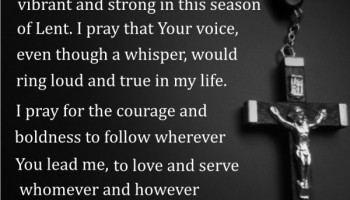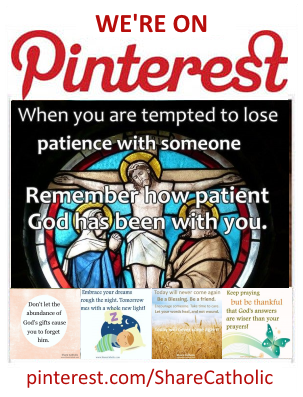
Prayer, to a Catholic is a form of communication like a conversation. It comes from a Latin word precari, which is to plead, beg or to ask. Catholics pray to the saints, to ask them to intercede or pray for us, on our behalf, to Almighty God. Protestants hold the position that it is unbiblical, to ask the saints in heaven to pray or intercede for us. Using Bible verses, we will begin to explain the foundation of this Catholic belief.
The Church is the Body of Christ:
The Catholic Church teaches that Jesus is the head and the Church is his body. All the faithful are members of the body of Christ and united to Christ and each other. Paul writes extensively about this in his letters as indicated below.
And he has put all things under his feet and has made him the head over all things for the church, which is his body, the fullness of him who fills all in all. (Eph 1:22-23)
The members of the body of Christ are to care for each other and if one suffers, all suffer and if one is honored all rejoice. Catholics believe that the saints in heaven are part of the body of Christ. The saints in heaven care for us on earth and help us with their prayers to Almighty God.
That there may be no discord in the body, but that the members may have the same care for one another. If one member suffers, all suffer together; if one member is honored, all rejoice together. Now you are the body of Christ and individually members of it. (1 Cor 12:25-27)
There is only one body including those in heaven and those on earth. The bible does not teach of a separate body or that those in heaven belong to a separate body. What we do know is that all the faithful are called in the one body and all are part of the same body.
There is one body and one Spirit, just as you were called to the one hope that belongs to your call (Eph 4:4)
Prayer is charitable, good and pleasing to God:
St Paul writes that supplications, prayers and intercessions be made for all and that this is good and acceptable too God.
First of all, then, I urge that supplications, prayers, intercessions, and thanksgivings be made for all men, for kings and all who are in high positions, that we may lead a quiet and peaceable life, godly and respectful in every way. This is good, and it is acceptable in the sight of God our Savior (1 Tim 2:1-3)
Catholics believe that the saints in heaven also pray for us, because they are united to us and part of the body of Christ. St Paul urges all Christians, out of love, to pray to God on his behalf. The bible gives no reason to believe that once anyone dies and are in heaven, that they would cease to pray on our behalf.
I urge you, brothers, by our Lord Jesus Christ and by the love of the Spirit, to join me in the struggle by your prayers to God on my behalf (Rom 15:30).
In [Jesus] we have put our hope that he will also rescue us again, as you help us with prayer (2 Cor 1:10).
St Paul, himself prays without ceasing for other Christians for their salvation. In the verses below, you will notice the love St Paul has for his fellow Christians and his constant prayer for them. Catholics believe that he continues to do so in heaven and prays for their salvation like the other saints. Nowhere in the bible does it say that he should cease to pray upon his death.
We always give thanks to God, the Father of our Lord Jesus Christ, when we pray for you, . . . we do not cease praying for you and asking that you may be filled with the knowledge of his will through all spiritual wisdom and understanding to live in a manner worthy of the Lord (Col 1:4, 9-10).
“My heart’s desire and prayer to God on their behalf is for salvation” (Rom 10:1)
“I remember you constantly in my prayers, night and day. I yearn to see you again” (2 Tim 1:3-4),
Protestants may object that these verses are only for those on earth. But where does the bible teach that God’s commandments do not apply to those in heaven? God’s commands are eternal and apply to those in heaven and earth. Just as the saints in heaven do not cease to love, they do not cease to pray as well for us. To love and to pray are both God’s commandments.
Christians are not separated from Christ by death:
Protestants will not have a problem with the Church being the body of Christ or that its members have to care for one another and pray for each other, but they would say that these instructions are only for those on earth. Catholics believe that Christ has achieved victory of death and because of this the saints in heaven are not dead but alive.
And now has manifested through the appearing of our Savior Christ Jesus, who abolished death and brought life and immortality to light through the gospel. (2 Tim 1:10)
We read in Matthew, that when the Sadducees came to Jesus to question him on the resurrection, Jesus answered that God is not the God of the dead, but of the living. Abraham, Isaac and Jacob experienced physical death, but they are called as living. The saints in heaven are not dead, but even more alive because of the resurrection. Luke also writes that at the resurrection, the dead are raised and no more dead but alive.
But Jesus answered them, “You are wrong, because you know neither the scriptures nor the power of God. For in the resurrection they neither marry nor are given in marriage, but are like angels in heaven. And as for the resurrection of the dead, have you not read what was said to you by God, I am the God of Abraham, and the God of Isaac, and the God of Jacob? He is not God of the dead, but of the living.” (Matt 22:29-32)
Now he is not God of the dead, but of the living; for all live to him. (Luke 20:38)
Jesus himself said that those who believe in him will never die, even though they die, because he is the resurrection and the life.
Jesus said to her, “I am the resurrection and the life; he who believes in me, though he die, yet shall he live, and whoever lives and believes in me shall never die. Do you believe this? (John 11:25-26)
St Paul writes in Romans that nothing can separate us from the love of Christ including death. The saints in heaven even though they died, are more alive and perfectly united with Christ in heaven.
Who shall separate us from the love of Christ? Shall tribulation, or distress, or persecution, or famine, or nakedness, or peril, or sword? As it is written, “For thy sake we are being killed all the day long; we are regarded as sheep to be slaughtered.” No, in all these things we are more than conquerors through him who loved us. For I am sure that neither death, nor life, nor angels, nor principalities, nor things present, nor things to come, nor powers, nor height, nor depth, nor anything else in all creation, will be able to separate us from the love of God in Christ Jesus our Lord. (Rom 8:35-39)
Speaking to a dead saint in the Bible:
Protestants will not be able to dismiss any of the arguments above because the bible is very clear on this. But they will say that the bible does not explicitly or implicitly tell us that we can pray to a saint who died a bodily death.
We read in the Gospel of Matthew that Jesus himself spoke to Moses and Elijah. Moses died thousands of years earlier and here we have an example of Jesus who spoke to a departed saint. How is it possible that Catholics are doing something wrong by talking to dead saints when Jesus who is our example did the same and he was without sin? They may reply that Jesus is God and can speak to anyone, but we have no example of Jesus violating any commandment. If talking to dead saints was supposedly forbidden in Scripture, why would Jesus (who did not break a single commandment) be doing it?
And after six days Jesus took with him Peter and James and John his brother, and led them up a high mountain apart. And he was transfigured before them, and his face shone like the sun, and his garments became white as light. And behold, there appeared to them Moses and Elijah, talking with him. And Peter said to Jesus, “Lord, it is well that we are here; if you wish, I will make three booths here, one for you and one for Moses and one for Elijah.” He was still speaking, when lo, a bright cloud overshadowed them, and a voice from the cloud said, “This is my beloved Son, * with whom I am well pleased; listen to him.” (Matt 17:1-5)
When Catholics are praying to saints, they are talking to glorified saints united to the body of Christ and asking for their prayers. All of this is supported by Sacred Scripture.
Saints in heaven are aware of events on earth:
Those in heaven are aware of events on earth. There will be rejoicing in heaven when a sinner repents, those in heaven are aware of this. We also read in the Book of Revelations that the martyrs in heaven cry out to God to avenge their deaths on those responsible on earth.
Just so, I tell you, there will be more joy in heaven over one sinner who repents than over ninety-nine righteous persons who need no repentance. (Luke 15:7)
When he opened the fifth seal, I saw under the altar the souls of those who had been slain for the word of God and for the witness they had borne; they cried out with a loud voice, “O Sovereign Lord, holy and true, how long before thou wilt judge and avenge our blood on those who dwell upon the earth?” (Rev 6:9-10)
In the Book of Hebrews, we read of great cloud of witnesses that are spectators to our race on earth, as we strive to reach our eternal destination. These great cloud of witnesses are aware of what is happening on earth.
“Therefore, since we are surrounded by so great a cloud of witnesses, let us rid ourselves of every burden and sin that clings to us and persevere in running the race that lies before us, while keeping our eyes fixed on Jesus, the leader and perfecter of faith” (Heb 12:1-2)
Prayers of the saints in the Bible:
In the Book of Revelations, we read that the twenty-four elders offer to God the prayers of the saints. They are interceding for the saints presenting to God, the prayers of the saints. The prayers of the saints are offered with incense before God.
And when he had taken the scroll, the four living creatures and the twenty-four elders fell down before the Lamb, each holding a harp, and with golden bowls full of incense, which are the prayers of the saints; (Rev 5:8)
And another angel came and stood at the altar with a golden censer; and he was given much incense to mingle with the prayers of all the saints upon the golden altar before the throne; and the smoke of the incense rose with the prayers of the saints from the hand of the angel before God. (Rev 8:3-4)
In the Book of Maccabees, we read of the vision of Judah which shows Jeremiah the prophet, who is in heaven praying for the people and the holy city. Protestants will take exception to this verse because it is one of the deuterocanonical books, which was taken out of the Bible by Martin Luther.
“And Onias spoke, saying, ‘This is a man who loves the brethren and prays much for the people and the holy city, Jeremiah, the prophet of God'” (2 Maccabees 15:14).
Prayers to angels in the Bible:
In the Old Testament, Kind David asks the angels in heaven to bless the Lord and praise the Lord in his prayer. Why would David ask this of the angels if they could not hear him? Catholics believe that the Saints in heaven and the angels hear our prayers.
“Bless the Lord, O you his angels, you mighty ones who do his word, hearkening to the voice of his word! Bless the Lord, all his hosts, his ministers that do his will!” (Ps. 103:20-21)
“Praise the Lord! Praise the Lord from the heavens, praise him in the heights! Praise him, all his angels, praise him, all his host!” (Ps. 148:1-2)
Additional Bible Verses:
There is neither Jew nor Greek, there is neither slave nor free, there is neither male nor female; for you are all one in Christ Jesus. (Gal 3:28)
For just as the body is one and has many members, and all the members of the body, though many, are one body, so it is with Christ. For by one Spirit we were all baptized into one body–Jews or Greeks, slaves or free–and all were made to drink of one Spirit. For the body does not consist of one member but of many. (1 Cor 12:12-14)
Rather, speaking the truth in love, we are to grow up in every way into him who is the head, into Christ, from whom the whole body, joined and knit together by every joint with which it is supplied, when each part is working properly, makes bodily growth and upbuilds itself in love. (Eph 4:15-16)
Therefore, putting away falsehood, let everyone speak the truth with his neighbor, for we are members one of another. (Eph 4:25)
For as in one body we have many members, and all the members do not have the same function, so we, though many, are one body in Christ, and individually members one of another. (Rom 12:4-5)
Wives, be subject to your husbands, as to the Lord. For the husband is the head of the wife as Christ is the head of the church, his body, and is himself its Savior. (Eph 5:22-23)
He is the head of the body, the church; he is the beginning, the first-born from the dead, that in everything he might be pre-eminent. (Col 1:18)
Let brotherly love continue. Do not neglect to show hospitality to strangers, for thereby some have entertained angels unawares. Remember those who are in prison, as though in prison with them; and those who are ill-treated, since you also are in the body. (Heb 13 1-3)
And let the peace of Christ rule in your hearts, to which indeed you were called in the one body. And be thankful. (Col 3:15)
Pray for us also, that God may open to us a door for the word, to declare the mystery of Christ, on account of which I am in prison. (Col 4:3)
Brethren, pray for us. (1 Thess 5:25)
To this end we always pray for you, that our God may make you worthy of his call, and may fulfill every good resolve and work of faith by his power. (2 Thess 1:11)






